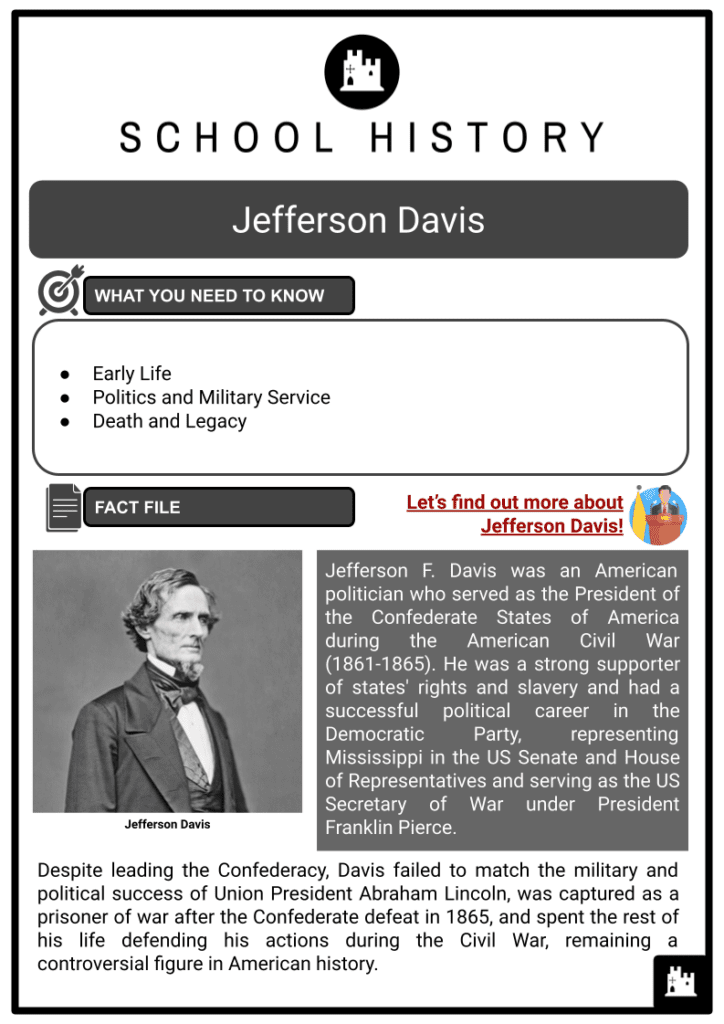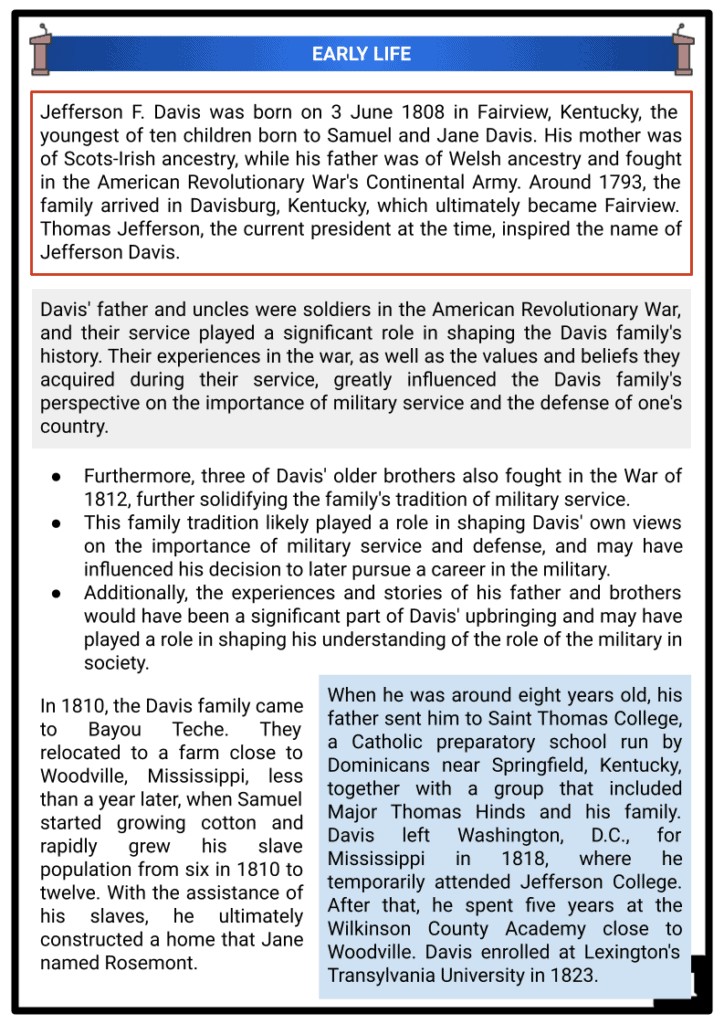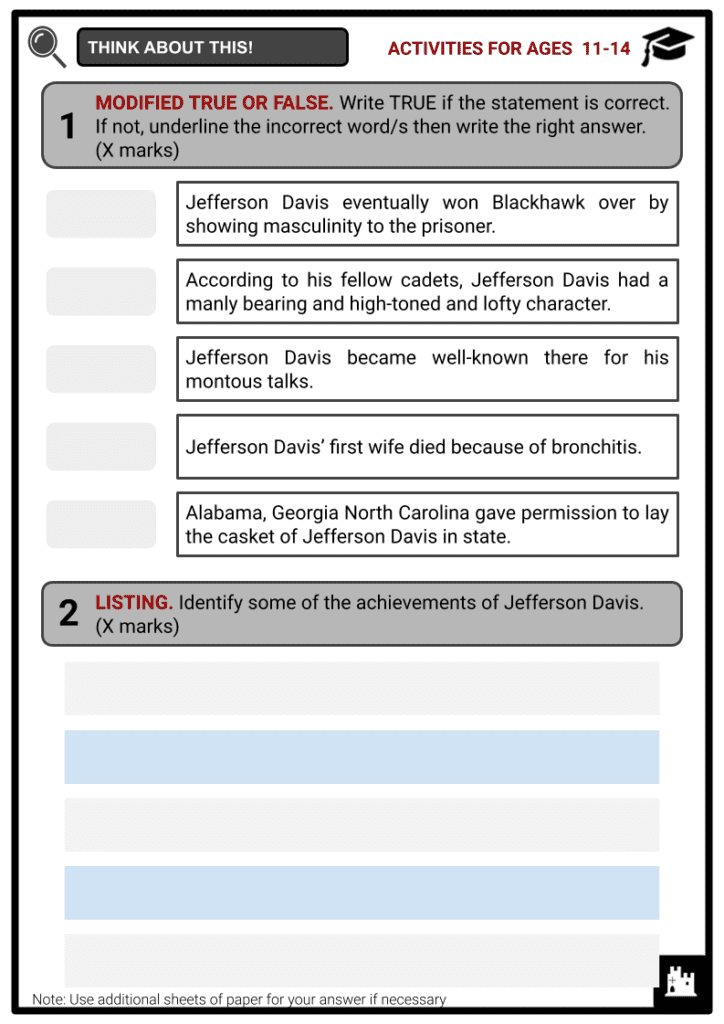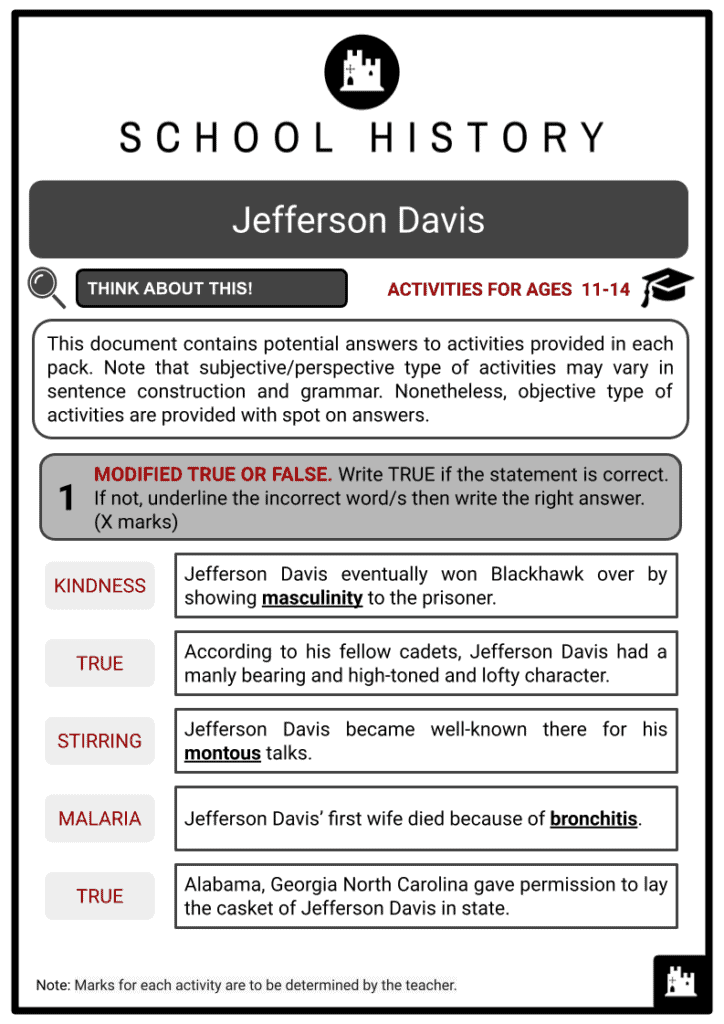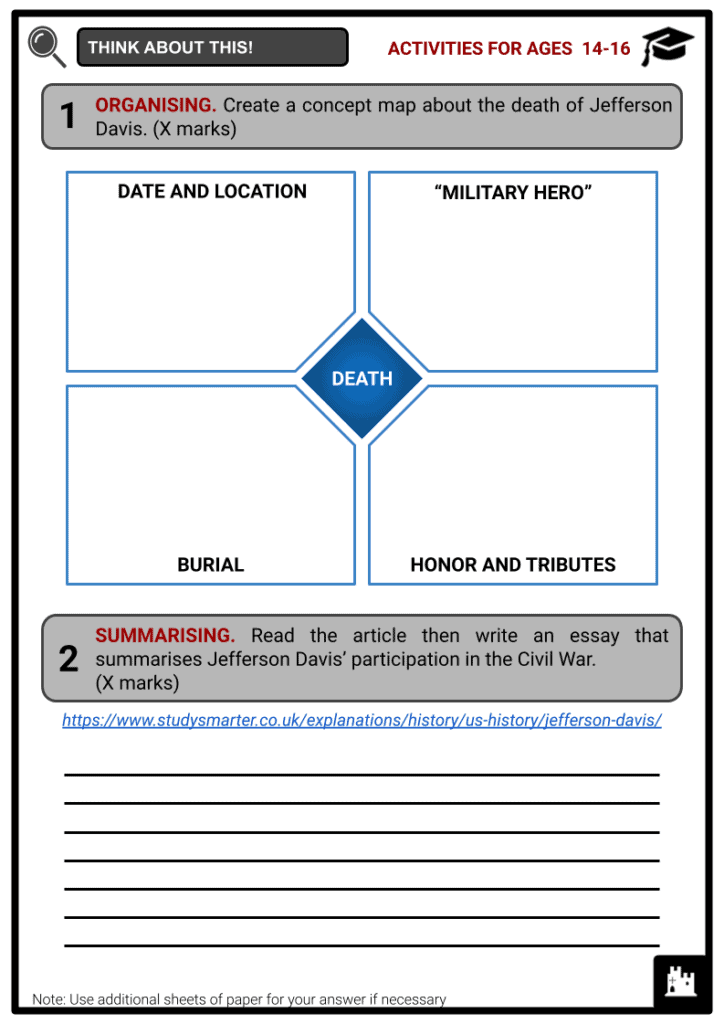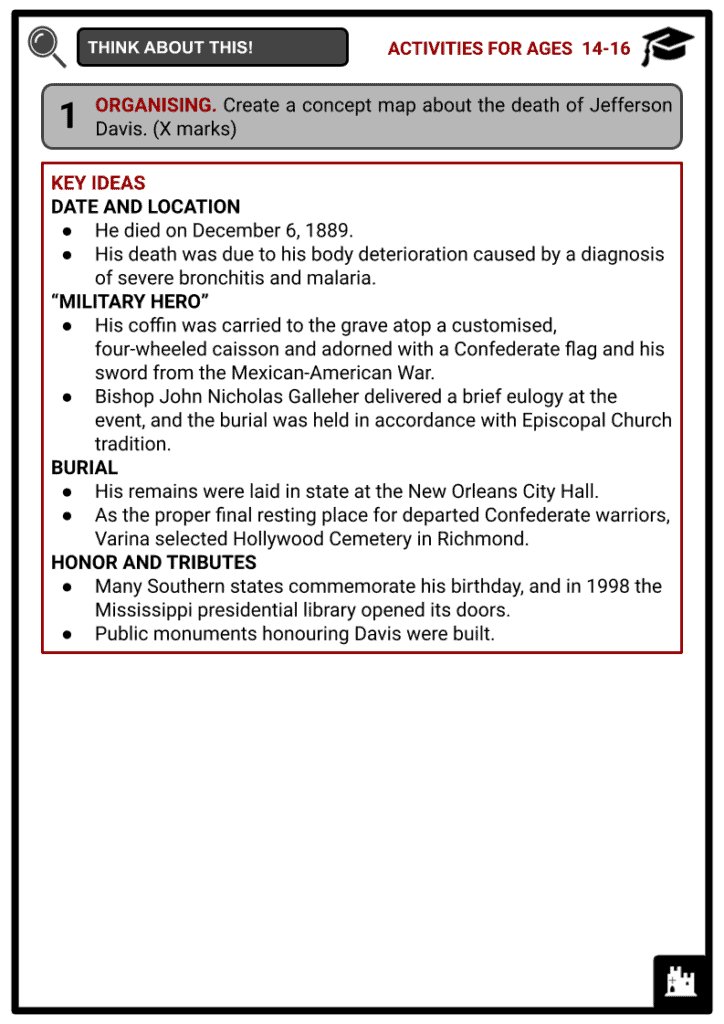Jefferson Davis Worksheets
Do you want to save dozens of hours in time? Get your evenings and weekends back? Be able to teach about Jefferson Davis to your students?
Our worksheet bundle includes a fact file and printable worksheets and student activities. Perfect for both the classroom and homeschooling!
Summary
- Early Life
- Politics and Military Service
- Death and Legacy
Key Facts And Information
Let's find out more about Jefferson Davis!
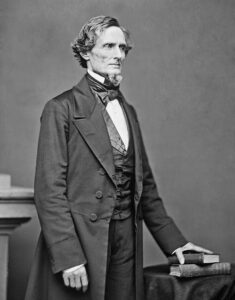
Jefferson F. Davis was an American politician who served as the President of the Confederate States of America during the American Civil War (1861-1865). He was a strong supporter of states' rights and slavery and had a successful political career in the Democratic Party, representing Mississippi in the US Senate and House of Representatives and serving as the US Secretary of War under President Franklin Pierce. Despite leading the Confederacy, Davis failed to match the military and political success of Union President Abraham Lincoln, was captured as a prisoner of war after the Confederate defeat in 1865, and spent the rest of his life defending his actions during the Civil War, remaining a controversial figure in American history.
EARLY LIFE
- Jefferson F. Davis was born on 3 June 1808 in Fairview, Kentucky, the youngest of ten children born to Samuel and Jane Davis. His mother was of Scots-Irish ancestry, while his father was of Welsh ancestry and fought in the American Revolutionary War's Continental Army. Around 1793, the family arrived in Davisburg, Kentucky, which ultimately became Fairview. Thomas Jefferson, the current president at the time, inspired the name of Jefferson Davis.
- Davis' father and uncles were soldiers in the American Revolutionary War, and their service played a significant role in shaping the Davis family's history. Their experiences in the war, as well as the values and beliefs they acquired during their service, greatly influenced the Davis family's perspective on the importance of military service and the defense of one's country.
- Furthermore, three of Davis' older brothers also fought in the War of 1812, further solidifying the family's tradition of military service.
- This family tradition likely played a role in shaping Davis' own views on the importance of military service and defense, and may have influenced his decision to later pursue a career in the military.
- Additionally, the experiences and stories of his father and brothers would have been a significant part of Davis' upbringing and may have played a role in shaping his understanding of the role of the military in society.
- In 1810, the Davis family came to Bayou Teche. They relocated to a farm close to Woodville, Mississippi, less than a year later, when Samuel started growing cotton and rapidly grew his slave population from six in 1810 to twelve. With the assistance of his slaves, he ultimately constructed a home that Jane named Rosemont.
- When he was around eight years old, his father sent him to Saint Thomas College, a Catholic preparatory school run by Dominicans near Springfield, Kentucky, together with a group that included Major Thomas Hinds and his family. Davis left Washington, D.C., for Mississippi in 1818, where he temporarily attended Jefferson College. After that, he spent five years at the Wilkinson County Academy close to Woodville. Davis enrolled at Lexington's Transylvania University in 1823.
- In 1824, he was still enrolled in college when he learnt that his father Samuel had passed away. Samuel had sold Rosemont and his slaves to his eldest son Joseph Emory Davis, who already owned a sizable plantation down the Mississippi River at Davis Bend, Mississippi, since he was in debt at the time of his death. Davis' life was probably significantly impacted by this incident, which may have also influenced his opinions on the institution of slavery and the function of the family in commerce and finance.
- Davis was given a cadetship at the United States Military Academy at West Point, New York, in 1824 by President James Monroe. Davis graduated from West Point in 1828, 23rd in his class, and was subsequently described by one of his fellow cadets as "distinguished in his corps for manly bearing and high-toned and lofty character."
POLITICS AND MILITARY SERVICE
- After completing his studies at West Point, Davis was given the position of second lieutenant in the First Infantry. He served in the American military on active duty for the first time from 1828 to 1833. Army. In the Blackhawk War of 1831, Davis fought alongside his troops and helped them capture Chief Blackhawk. The Indian chief was sent to Davis, who eventually won Blackhawk over by showing kindness to the prisoner.
- Davis received a promotion to first lieutenant in March 1833 and was then sent to the First Dragoons, a brand-new regiment. He was the staff officer for the group as well. Davis continued to fight on the battlefield until the summer of 1835 against Comanche and Pawnee Indian groups.
- Sarah Knox Taylor, the daughter of his commanding officer, and Davis were married in June 1835. Prior to the wedding, Davis unexpectedly resigned from the service because his commanding officer—none other than future president Zachary Taylor—was against the union. Sadly, Sarah passed away in September 1835 from malaria a just few months later.
- Davis started farming cotton after his time in the service and was getting ready to enter politics as a Democrat. He took part in the 1843 governor's race and was a delegate to the Democratic National Convention. He became well-known there for his stirring talks. He took the position of state protection against federal intrusion and supported Texas' annexation in the process. A year later, he was elected as an elector for Polk and Dallas.
- Davis became the country's president in December 1845. He won a seat in Congress and the House of Representatives, which increased his notoriety. In addition, he got remarried, this time to Varina Howell. Given that Varina's family belonged to the class of Mississippi planters, the marriage further strengthened his relationship with them.
- Davis immediately got embroiled in discussions regarding Texas, Oregon, and tariffs as a lawmaker because of his fiery and entertaining comments. Davis' work in Congress includes organising the fortification of military training facilities. He always backed the right of the states during his time in Congress.
- Jefferson Davis left his post as a member of Congress in June 1846 to command the First Regiment of the Mississippi Riflemen in the Mexican-American War. Under his previous father-in-law, General Taylor, he was a colonel. Davis participated in the Battles of Monterrey and Buena Vista, which took place in 1846 and 1847, respectively, during the Mexican-American War.
- He led his troops to success in an attack on Fort Teneria during the Battle of Monterrey. He sustained injuries at the Battle of Buena Vista when he stopped a rush of Mexican swords, an action for which he received much praise. General Taylor was so taken aback that he acknowledged he had previously misunderstood Davis' character. Taylor allegedly said, "My daughter, sir, was a better judge of men than I was."
- Davis said that while serving in the Senate, his views on the Union had changed. Previously, he had vowed his allegiance to the Union of their fathers. On the Senate floor, he had disputed any claims of his loyalty to the Union. His long-lasting and well-known services, in both the civil and military spheres. He was sure the citizens of Mississippi would not think he had betrayed their trust by using his influence to overthrow the government. He thought that the states' split was a terrible thing, but not the worst.
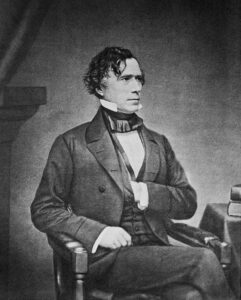
Franklin Pierce - President Pierce named Davis secretary of war in 1853. He held it until 1857, when he was elected back to the Senate. Although opposed to secession, he continued to support the rights of Southern slave states while serving in the Senate. Until Mississippi withdrew from the Union in January 1861, Davis served in the Senate.
- On 18 February 1861, Davis was elected president of the Confederate States of America in connection with the creation of the Confederacy. He was apprehended by Union troops on 10 May 1865, close to Irwinville, Georgia, and accused of treason. From 22 May 1865, until 13 May 1867, Davis was detained in Fort Monroe, Virginia. He was eventually freed on bail, some of which was paid by abolitionist Horace Greeley.
DEATH AND LEGACY
- After serving as Confederacy's president, Davis made business trips abroad. He turned down an invitation to become the university's president once it became Texas A&M. He was also encouraged to run for the Senate again, despite the fact that, according to the 14th Amendment, he needed the support of both the Senate and the House in order to do so.
- In an effort to support his political position, he authored The Rise and Fall of the Confederate Government in 1881. Davis spent his golden years at the Beauvoir estate in Mississippi.
- During a visit to his Brierfield plantation in November 1889, Davis became unwell and was given a diagnosis of severe bronchitis and malaria. He was brought to Charles Erasmus Fenner's house, where he spent the next two weeks bedridden but stable. He started to deteriorate in early December and passed away around 12:45 in the morning, on Friday, 6 December 1889, with his wife Varina by his side.
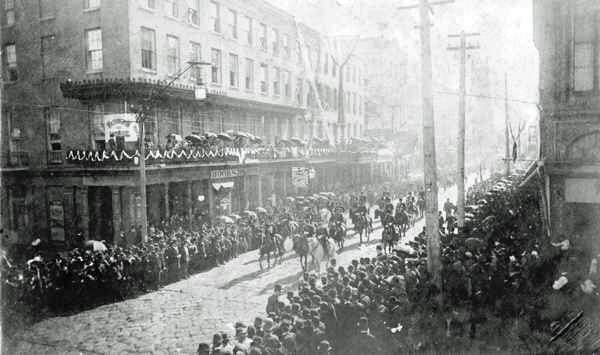
Franklin Funeral Procession of Davis - From 7 December to 11 December, Davis's remains was laid in state at the New Orleans City Hall. An estimated 200,000 people attended his burial. To highlight his status as a military hero, his coffin was carried to the grave atop a customised, four-wheeled caisson and adorned with a Confederate flag and his sword from the Mexican-American War. Bishop John Nicholas Galleher delivered a brief eulogy at the event, and the burial was held in accordance with Episcopal Church tradition.
- Following Davis's burial, many Southern states asked to serve as the location of his ultimate resting place.
- As the proper final resting place for departed Confederate warriors, Varina selected Hollywood Cemetery in Richmond.
- Davis's remains were transported from New Orleans to Richmond in May 1893, receiving military honours and governor visits along the route.
- Three state capitals — Montgomery, Alabama; Atlanta, Georgia; and Raleigh, North Carolina — permitted the casket to lay in state. After Davis was reinterred, his children were also reburied there at Varina's wish, and after Varina passed away in 1906, she was also buried next to Davis.
- Davis was a strong and prominent leader who left behind a legacy that is comparable to that of previous US presidents in several regards. Many Southern states commemorate his birthday, and in 1998, the Mississippi presidential library opened its doors. His posthumous restoration of U.S. citizenship occurred in 1978.
- Public monuments honouring Davis, like those to other Confederate leaders, have recently sparked a lot of debate. After a protracted legal struggle, Memphis, Tennessee, locals were successful in having a monument of Davis removed from a park in December 2017.
- A panel was established to provide recommendations on how to effectively portray the actual narrative of the Confederate-era sculptures on Monument Avenue, according to Richmond Mayor Levar Stoney, who made the announcement in the summer of 2017.
- The group recommended the removal of a 111-year-old bronze monument of Davis in a report issued the following July, but doing so would need taking legal action to amend a state statute.
- Other suggestions included establishing a memorial to slaves and to troops of the United States Colored Troops who participated in the Civil War, as well as creating more extensive exhibitions to put the sculptures of Generals Robert Lee and Stonewall Jackson in context.

